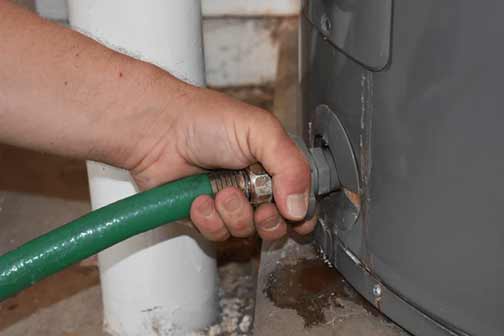Understanding the Source of the Rotten Egg Odor
The unpleasant smell emanating from your water heater, often likened to rotten eggs, can be both perplexing and frustrating. This odor is typically due to the presence of hydrogen sulfide gas, which is generated when sulfate-reducing bacteria react with the anode rod in the heater. Understanding the root cause of this issue is crucial for effectively addressing and preventing it. By getting into the specifics of how this odor develops, homeowners can better manage their water heating systems and ensure a fresher water supply.
The Chemistry Behind the Smell: Unraveling the Hydrogen Sulfide Mystery
Hydrogen sulfide (H2S) is a colorless gas known for its pungent odor reminiscent of rotten eggs. In water heaters, this gas forms when sulfate-reducing bacteria use the sulfate ions present in the water as a source of energy, producing hydrogen sulfide as a byproduct. These bacteria thrive in environments devoid of oxygen, such as the inside of a water heater. Understanding this chemical process is key to diagnosing and mitigating the odor issue effectively. The interaction between the water’s natural components and the materials within the heater creates a perfect storm for this unpleasant phenomenon.
Factors Contributing to Bacterial Growth: Creating the Perfect Environment for Odor
Several conditions can promote the growth of sulfate-reducing bacteria in water heaters:
- Warm Water Temperature: Water heaters maintain temperatures conducive to bacterial growth, typically around 32-37°C (90-98°F). This range is ideal for these bacteria to thrive and multiply.
- Presence of Sulfates: Sulfate ions, naturally present in water supplies, provide the necessary nutrients for bacterial proliferation. These ions are often found in groundwater and can vary depending on geographic location.
- Anaerobic Environment: The lack of oxygen inside the heater creates an ideal setting for anaerobic bacteria. Without oxygen, these bacteria can outcompete other microorganisms that might otherwise keep them in check.
- Type of Anode Rod: Magnesium or aluminum anode rods can enhance bacterial activity, as they react with water to produce hydrogen gas, further fueling the bacteria. The choice of anode rod material can significantly influence bacterial growth and odor production.
Effective Prevention Strategies: Keeping the Rotten Egg Smell at Bay
Preventing the rotten egg odor from your water heater involves a combination of maintenance practices and strategic interventions:
- Regular Flushing: Periodically flushing your water heater can remove sediment and reduce bacterial growth. This practice helps maintain a cleaner environment within the heater, making it less hospitable for bacteria.
- Replace the Anode Rod: Switching to a zinc-aluminum or powered anode rod can inhibit bacterial activity. These alternatives are less reactive with water, thereby reducing the production of hydrogen gas.
- Install a Water Filtration System: A filtration system can reduce sulfate levels in your water supply, limiting bacterial growth. By addressing the problem at its source, filtration systems can significantly decrease the likelihood of odor formation.
- Chemical Treatments: Using hydrogen peroxide or chlorine can sanitize the water heater and kill existing bacteria. These treatments are effective in managing bacterial populations and preventing odor issues.

Professional Maintenance and Inspection: Ensuring Optimal Water Heater Performance
Engaging a professional plumber for regular maintenance and inspection of your water heater can be invaluable. Plumbers can identify potential issues early and recommend tailored solutions to prevent the recurrence of unpleasant odors. Professional inspections can also ensure that your water heater is operating efficiently and safely, extending its lifespan and ensuring the need of a premature water heater replacement.
Understanding the Impact on Health and Safety: Beyond the Nuisance
While the rotten egg smell is primarily a nuisance, it’s essential to recognize the potential health implications. High concentrations of hydrogen sulfide gas can be toxic, leading to respiratory issues and other health problems. Ensuring your water heater is free from this odor not only enhances comfort but also safeguards your health. It is crucial to address any odor issues promptly to prevent potential health risks to you and your family.
Environmental Considerations: The Broader Impact of Reducing Odor
Addressing the odor issue also has environmental benefits. Reducing bacterial growth in water heaters minimizes the release of hydrogen sulfide into the environment, contributing to a healthier ecosystem. By taking steps to prevent odor formation, homeowners can play a role in reducing pollution and promoting environmental sustainability.
Long-term Solutions for Odor-Free Water Heating: Sustaining Freshness and Efficiency
Implementing long-term strategies to keep your water heater odor-free is crucial for sustained comfort and efficiency. Regular monitoring, timely maintenance, and adopting advanced technologies can ensure your water heater operates optimally without unpleasant smells. By investing in quality equipment and staying proactive about maintenance, homeowners can enjoy a reliable and odor-free water heating experience.
Conclusion: Ensuring a Fresh and Safe Water Supply
Understanding the causes of the rotten egg smell in water heaters and implementing effective prevention strategies can significantly improve the quality of your water supply. By taking proactive measures, you can enjoy a fresh, odor-free water experience while ensuring the safety and efficiency of your water heating system. With the right approach, homeowners can maintain a pleasant and healthy home environment, free from the discomfort and potential hazards of unwanted odors.


